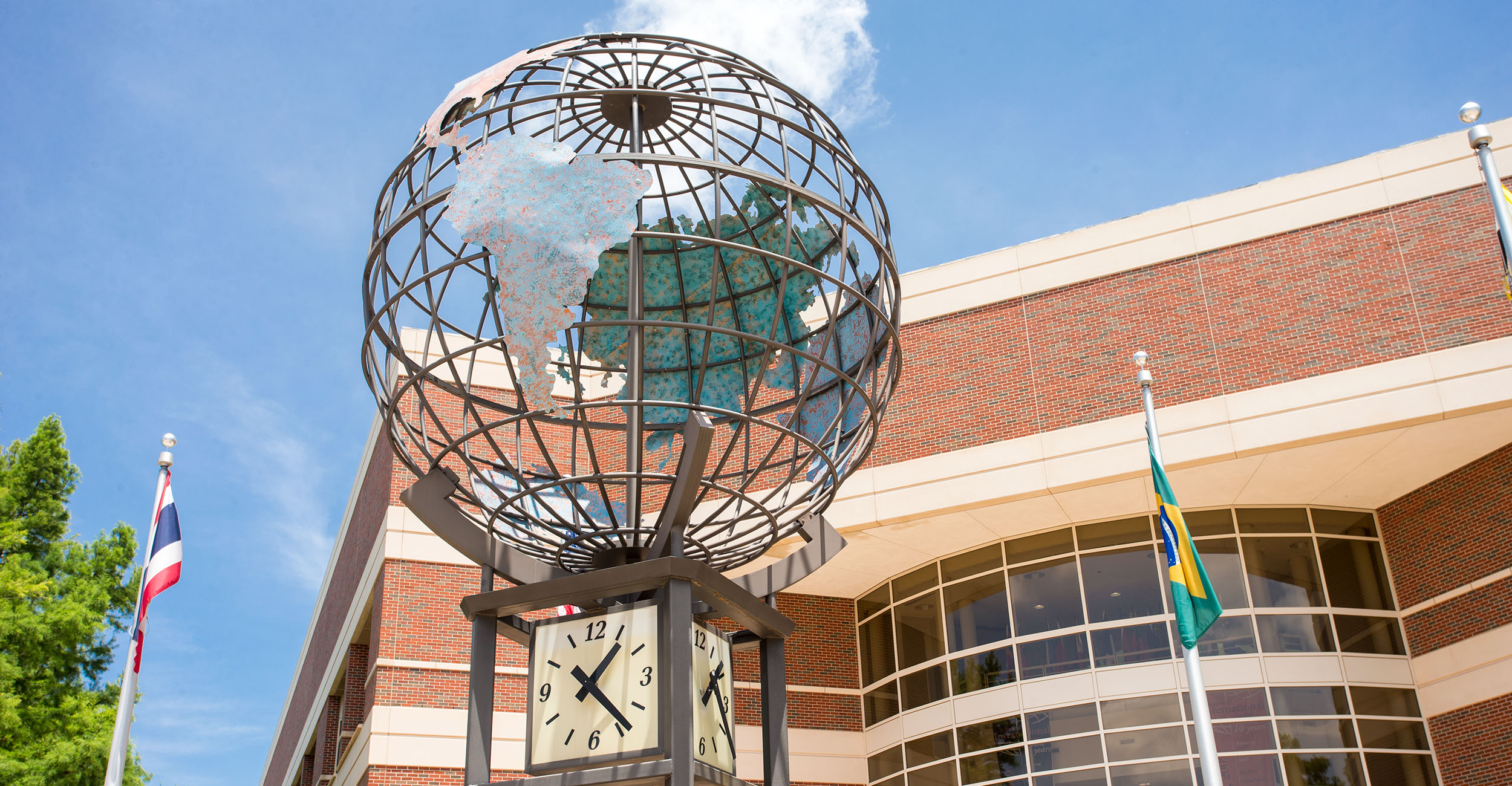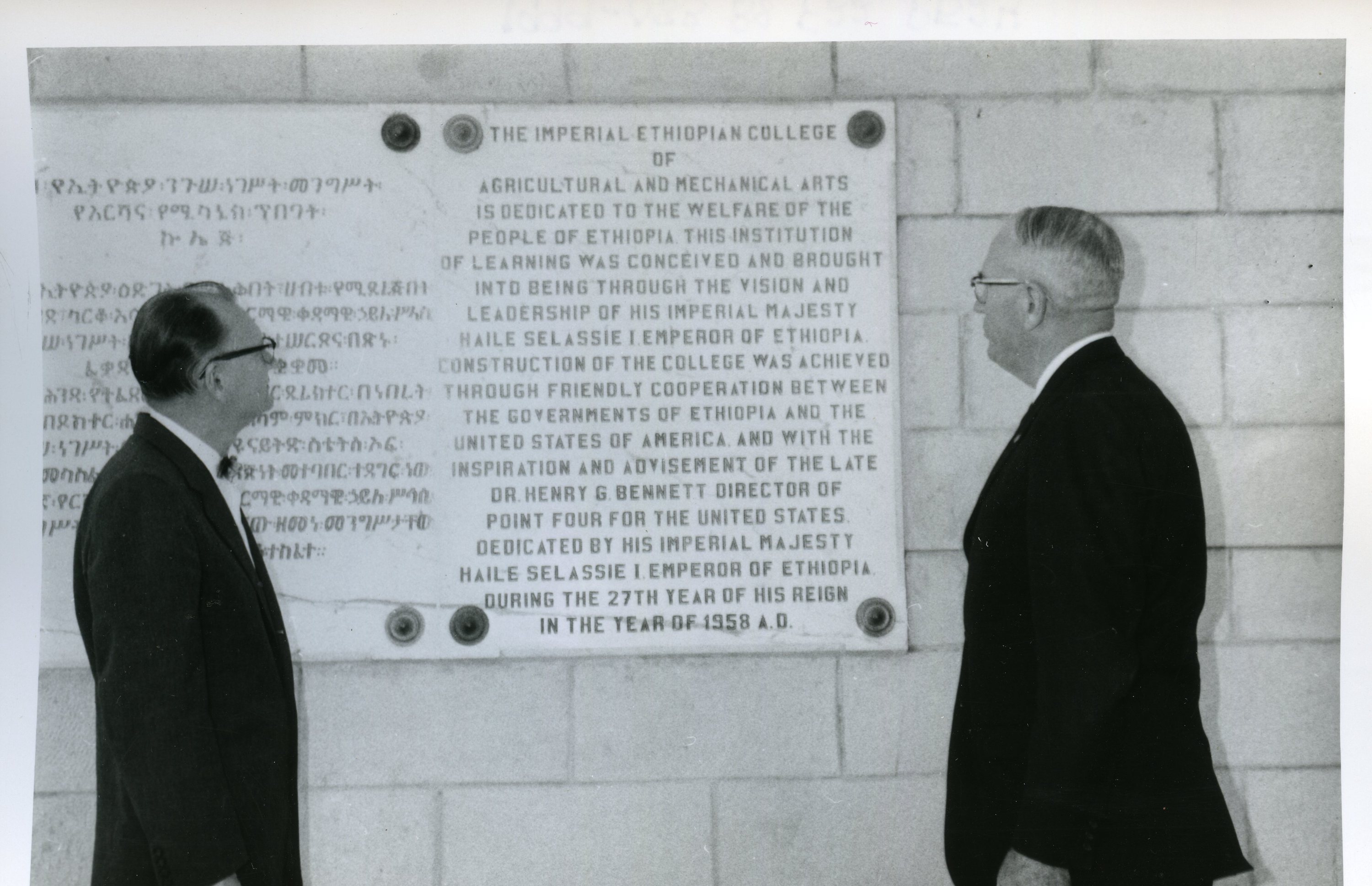
Beginning a New Chapter: School of Global Studies and Partnerships Becomes OSU Global
Thursday, May 4, 2023
Media Contact: Kelli Norton | Communication Specialist | 405-744-5496 | kelli.norton@okstate.edu
As Oklahoma State University has been globally engaged for over seven decades, the campus infrastructure to support that global engagement has evolved dramatically through the years.
In January 2023, with the announcement of the rebranding of the School of Global Studies and Partnerships as OSU Global, yet another milestone was achieved to mark these efforts.
The school has grown exponentially from its opening in the late 1940s and has undergone different phases throughout the years.
Phase I: Presidential Progress
Although there were some international ties prior to 1949, the university — then known as Oklahoma A&M College — made its first significant international efforts beginning in the aftermath of World War II.
OAMC President Henry G. Bennett led the efforts following U.S. President Harry S. Truman’s inaugural speech in January 1949. There, Truman announced a plan to create a program to provide technical support to the developing world. It was the fourth point in his speech and the resulting program was referred to as the “Point Four Program,” and would soon become known as the Technical Cooperation Administration.
Bennett, who was a well-recognized figure in promoting economic growth and stability
in the developing world, spent the summer of 1949 traveling postwar Europe with the
Civilian Agricultural Department of the Army. He gathered information on food shortages
following WWII and suggested potential solutions.
 In 1950, Emperor Haile Selassie of Ethiopia requested Bennett’s expertise on the possibility
of establishing an agricultural college in his country. After returning from Ethiopia,
Bennett secured a meeting with Truman in Washington, D.C., in which he discussed his
travels and beliefs in regards to educational assistance for developing countries.
Truman requested a report on Bennett’s visit to Ethiopia and was so impressed with
his philosophies on education that he appointed Bennett as administrator of the Technical
Cooperation Administration in November 1950.
In 1950, Emperor Haile Selassie of Ethiopia requested Bennett’s expertise on the possibility
of establishing an agricultural college in his country. After returning from Ethiopia,
Bennett secured a meeting with Truman in Washington, D.C., in which he discussed his
travels and beliefs in regards to educational assistance for developing countries.
Truman requested a report on Bennett’s visit to Ethiopia and was so impressed with
his philosophies on education that he appointed Bennett as administrator of the Technical
Cooperation Administration in November 1950.
As a result of Bennett’s visit to Ethiopia in 1950 and his relationship with Selassie, Ethiopia became the first country to request assistance through the Point Four Program. An agreement was signed in the summer of 1952 for the university to provide assistance in establishing an entire agricultural ecosystem, including educational institutions, research stations and nationwide extension services.
Unfortunately, Bennett, his wife, Vera, and several aides were killed in a plane crash outside of Iran while on a mission for the TCA in 1951. The university, then under the leadership of President Oliver Willham, continued the commitment and dozens of university staff began preparations to help fulfill this goal. The first OSU personnel arrived in Ethiopia in the early fall of 1952.
At this time, international engagement was not an essential element at OAMC. In 1949, only 61 international students studied on campus, and an on-campus intensive English language study program was formed only in 1970. The study abroad office at the university was not formed until 1996. Nevertheless, the university created the Office of International Programs (OIP) in 1951 to provide critical administrative support to the project in Ethiopia.
Soon, however, it became clear that addressing a broad spectrum of problems, not just agriculture, was a strength of the university. In 1955, the university began the first technical teacher training program in Pakistan, and OSU faculty developed model polytechnic schools in what is now Bangladesh. In addition, university faculty contributed to engineering educational programs in Brazil. The efforts of the university now included not just faculty from the disciplines of agriculture, but also engineering, education, human sciences and others.
The university developed an international reputation for its work overseas, and in 1969 was honored with a distinguished service award from the Institute of International Education and the Reader’s Digest Foundation.
Phase II: International Expansion
In the 1970s and ’80s, OSU continued its international efforts on campus and continued to grow the organization infrastructure to support internationalization, such as the founding of the English Language Institute in 1970 and a Study Abroad Office in 1996.
In the mid-1980s, U.S. Congressman Wes Watkins worked with the university to create the Center for International Trade Development as a physical space that would support research and programs to promote international trade. Groundbreaking for the new building occurred on April 22, 1988, and the Wes Watkins Center for International Trade Development facility was completed in 1990. Nine years later, OSU celebrated the 50th anniversary of Point Four with a dedication ceremony in 1999.
In 1999, under OSU President James Halligan, the university created a School of International Studies, which was the first academic program to be offered on campus with an exclusive emphasis on the hallmarks of the university’s emphasis on addressing global problems. The SIS, a graduate-only program, became one of the most visible elements of the new International Education and Outreach (IEO) unit, which included the Study Abroad Office, the English Language Institute, the Fulbright Support Center and a Mexico Liaison office.
The university’s growth in international engagement continued throughout the early part of the 21st century under the umbrella of IEO. OSU faculty and staff chartered the university branch of Phi Beta Delta.
In 2010, IEO became International Studies and Outreach (ISO), a result of a universitywide study to better leverage OSU’s international strengths. Not long after, in 2015, a number of important endowments and scholarships were provided by donors, including the Iranian and Persian Gulf Studies program and the Don and Cathey Humphreys endowments to support study abroad.
In 2017, ISO was replaced by the School of Global Studies and Partnerships (SGSP), part of an initiative to raise the visibility and strength of the School of International Studies. The School of International Studies was renamed School of Global Studies, both to reflect the “global” nature of important international issues, but also to emphasize a global, rather than bilateral or binational, approach to solving important global issues. The master’s degree curriculum was updated to reflect a more focused approach to studying global issues, and the school added its first full-time faculty members.
In 2019, the China Programs Office and International Students and Scholars office were moved into the SGSP and the Wes Watkins Center, reflecting an understanding of the importance of international students to the university’s global footprint and agenda, and a commitment to providing a consistent level of support for all international activities across campus.
The COVID-19 pandemic, which began in 2020, devastated global engagement for OSU, as it did for every other university around the world. The number of students traveling abroad, as well as international students coming to OSU, plummeted, and faculty engagement also declined during this time.
The staff of SGSP, however, used the relative decline in activity to reposition several of its programs and units for post-pandemic growth, and in 2021, during its 25th anniversary year, the Study Abroad/National Student Exchange Office was renamed as the Center for Global Learning, to better prepare a broader audience of OSU students for international engagement.
The next year, the ELI became the English Language and Intercultural Center (ELIC), reflecting an updated approach, curriculum and greater ability to offer intercultural training sessions across the university, rather than strictly English language programming.
In January 2023, SGSP changed its name again to OSU Global, while the academic program kept the name of School of Global Studies. This new brand is intended to better reflect to both internal and external constituents, including its many global partners, that the office represents the entire university in its international endeavors.
Throughout the seven decades of OSU’s global engagement, there have been many approaches and strategies, and indeed, even names of the supporting offices. What has remained consistent, however, has been a strong commitment by the university and its faculty, students and staff, to prepare students for careers of global leadership and to utilize faculty expertise to meet the challenges of nations around the world.
OSU’s engagement with the world began as an effort to bring technical agricultural knowledge to Ethiopia, but its commitment to addressing global needs has expanded to include the entire spectrum of intellectual capital at the university, from every discipline and field.
Photos By: Phil Shockley, Gary Lawson and OSU Archives
Story By: Dr. Randy Kluver | GLOBAL Magazine
